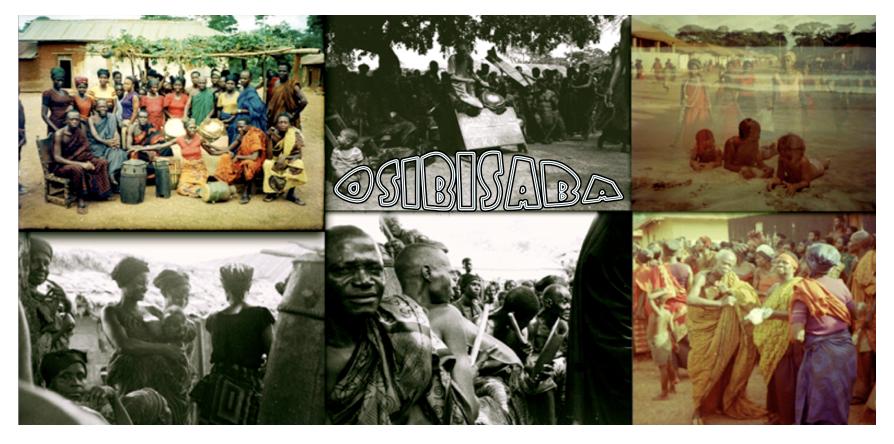Moving away from popular music for the moment, I would like to present "Adowa," a traditional genre/dance of the Asante of Ghana. Like other traditional music genres, Adowa combines drumming and percussion with dancing and call-and-response style singing. This music serves a profound social function, as Adowa is a dance that is performed at and often associated with funerals. Accordingly, song texts are frequently philosophical in nature, meditations on life, death, and humankind itself.
This particular recording by Onyame Nkrabea Nwomkro features three twenty-minute long tracks in medley style. The drummers maintain a minimal presence throughout, allowing the powerful chorus of singers to take the forefront. This music is beautiful and stunning, and I find myself totally absorbed in the complex melodic lines sung by the lead singers and the lead drummer's varied Atumpan phrases.
Download Onyame Nkrabea Nwomkro - "Adowa"
Please read below for some more detailed information on Adowa:
 |
"The [Ensemble] includes one or two bells - dawuro (boat-shaped) or slit-type called adawuraa; one or two hourglass drums called donno; one sonorous drum played by the hand called apentemma; one tenor drum played with stick called petia; and a talking drum called atumpan.
With the exception of the bells which may be played by women, the rest of the instruments are played by men, while women form the chorus. Normally one of the bells is regarded as the 'primary' bell while the other bell functions as 'the bell that crosses.'
The hourglass drum plays something in simple duple thyrhms. Where there are two, the second one plays cross rhythm. The main function of the apentemma drums is to suply recurring high-pitched tones. The drummer works in patterns of low and high pitches. The basic rhythm of the peti is a simple 5-note phrase made up of alternating simple and duple rhythmic motif rather like the primary bell.
The atumpan is the most important of all the instruments in the ensemble. When the music starts, the drummer may first make an announcement of drums or give a short message of sympathy. Immediately after this, he may begin with first, the introductory rhythms, and then other rhythms follow, to give the dancer the opportunity to find his bearing or time. This could be followed by other rhythmic motifs, all these go to animate the dance."
The meaning of the word "Adowa" is interesting in itself. Adowa is the Asante name for the Royal Antelope (pictured right), one of the rarest and smallest of the antelope species (about the size of a house cat). This tiny animal is considered exceedingly graceful in its movements, and it is this type of graceful movement that Adowa dancers must imitate and express. The Adowa genre, then, is named after this small antelope.
I've already introduced the Atumpan drums briefly in this post. Played in pairs of two differently pitched drums, the Atumpan is used to express verbal phrases, proverbs, and appellations. The experienced player is able to translate these speech patterns (many of which are set phrases) onto the Atumpan based upon the different tones of the Twi language. In Adowa another layer of complexity is added. Here, the lead drummer plays set Adowa phrases on the Atumpan that correspond to specific dance actions. In effect, this drummer controls the dancers' steps and motions by playing through a commonly recognized repertoire of drum proverbs/phrases.






Great post, very well informed and interesting. I should have give you my Kpalongo 's post, you would have write richer things than me. Best regards.
ReplyDeleteThanks for the kind words, Oro. I'm enjoying the Kpalongo music as well!
ReplyDeleteThanks for this beautiful roots music. I must say that was an equally good intro/description of the Adowa music. Your blog serves as one for education as well.
ReplyDeleteKeep it up.
Thanks for your support, David.
ReplyDeleteThis is really an interesting blog as it focuses on the very important topic. i came to know about so many things or tips.
ReplyDeleteVery good. I learned so much!
ReplyDeletePlease we want to learn more from you i feel proud to be a Ghanaian. Pls never stop continue for our generation to know where they are coming from
ReplyDelete